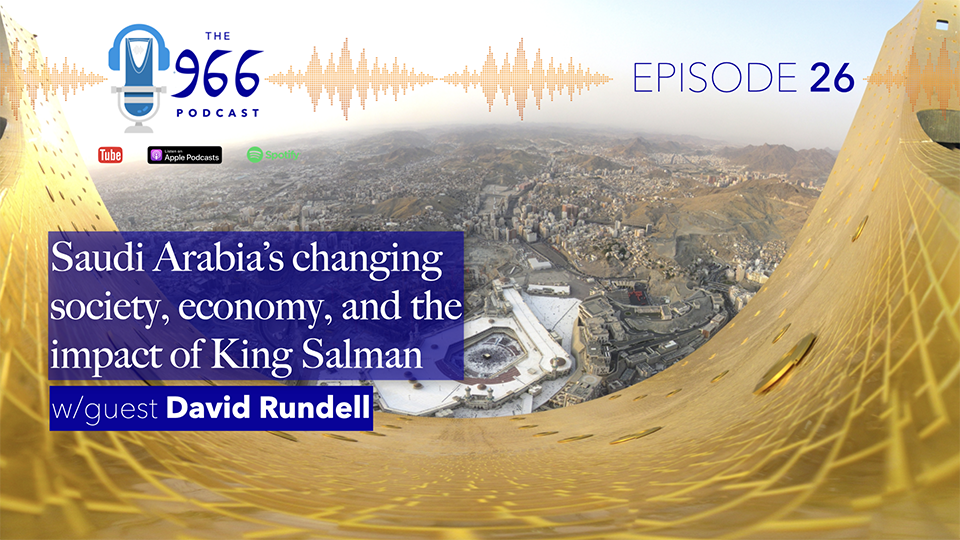David Rundell, author of Vision or Mirage: Saudi Arabia at the Crossroads joins this week for Episode 26 of The 966. The hosts and David talk about the Saudi Games 2022, the cost of air pollution in the “MENA region,” then discuss the important role of King Salman in the history of Saudi Arabia and his significant impact. The hosts then finish with Yallah! and talk ‘Founding Day’ logo, the World Defense Show, Fitch and Moody’s PIF ratings, polo in the desert and much more…
Saudi Arabia’s changing society, economy, and the impact of King Salman with guest David Rundell, author of the book Vision or Mirage, Saudi Arabia at the Crossroads.
7:16 – Richard’s one big thing this week is the Saudi Games 2022 will welcome 6,000 athletes in March – the first time this huge event has been held in the Kingdom.
6000 athletes from both sexes will compete in 45 sports in the host city Riyadh from March 10 – 20 with big prizes awarded.
Air pollution alone costs the MENA region about $141 billion a year, or 2% of economic output. Air pollution levels in MENA’s largest cities are among the highest in the world. The average citizen in these cities is breathing in air that is 10 times more polluted than the WHO says is safe.The World Bank study said air pollution causes about 270,000 deaths a year, and the average MENA resident is sick at least 60 days in his/her lifetime due to exposure to elevated air pollution levels.
The report talks about damage to the region’s seas and coasts, which is especially interesting for Saudi Arabia as it is full steam ahead with plans to develop its Red Sea coastline for tourism.
•Authorities in Saudi Arabia released the new logo for the “Founding Day,” a new holiday in Saudi Arabia to be celebrated in February, which includes various historical and traditional symbols linked to the glories, heroisms and nobility of the Saudi state. Per Arab News, “The phrase “Foundation Day — 1727 AD” is written below in a font inspired by several ancient manuscripts chronicling the history of the first Saudi state, so that the logo’s comprehensive message is linked to the values that represent the common Saudi culture, and conveys the meanings of pride, enthusiasm, authenticity, interdependence, hospitality, generosity, knowledge and science.”•Organizers for the upcoming World Defense Show in Riyadh said they have sold out all of its pavilllions, as the Kingdom gears up to host its first major global defense and security event of its kind in Saudi Arabia. On March 5, as a pre-cursor to the inaugural World Defense Show, the first-ever Riyadh Defense Forum will be conducted by the International Institute for Strategic Studies (IISS). Founded by the General Authority for Military Industries (GAMI), the World Defense Show will kick off the first day with a “spectacular opening ceremony featuring live demonstrations of interoperable defense capabilities across all key domains.”
•U.S. Central Command boss Gen. Kenneth F. McKenzie Jr said there is ‘Rare Opportunity’ to Integrate Air, Missile Defense in Gulf Region, according to a report from Airforcemag.com. McKenzie said that “the most immediate and credible threats to the American homeland” are still coming from the Middle East. Iran “remains the central threat around which U.S. Central Command is organized and my top priority as its commander,” McKenzie said in remarks to the Middle East Institute. “Specifically, my mission is to deter Iran from undertaking malign activities that undermine the security and stability of the region.”
•Saudi Arabia’s Public Investment Fund (PIF) has been assigned debut ratings by agencies Fitch and Moody’s, receiving an ‘A’ rating and ‘A1’ rating, respectively. The PIF is looking to extend credit facilities and raise public debt to fund its ambitious spending and investment commitments at home and abroad, according to the Financial Times. Fitch said when issuing the rating, ““It is Fitch’s view that the government has an oversight over PIF, notably over its investment and funding strategies through its Board of Directors, which is chaired by the Crown Prince and governed by appointed Ministries and government officials. Since 2015 PIF is organised under Council of Economic and Development Affairs of Saudi Arabia (CEDA) chaired by the Crown Prince, which is the supervisory body over PIF’s operations. As the key policy -driven economic agent of Saudi Arabia, Fitch does not expect changes to PIF’s status, ownership and control over the medium term.”
•Saudi Arabia’s Ministry of Human Resources and Social Development (MHRSD) has approved the introduction of work from home in the government sector. The ministry’s approval of telework as a new method of work in the government sector is part of achieving diversification and ensuring continuity of jobs in various work environments.
•The Richard Mille AlUla Desert Polo 2022 is set to become the first modern polo tournament in the world to be staged in the desert. Taking place on 11 – 12 February, the event will bring together polo patrons and professionals from around the world. Organized by RCU in partnership with the SPF and Richard Mille, the event marks the second season of the two-day tournament, first introduced by RCU in 2020. Richard Mille became the name sponsor as of today.









